Keeping Families Connected Through Deployment
Deployment changes family life in many ways. As a parent leaves, the care of the children and household is left to the remaining parent or other family members. It is a difficult time for all family members and young children (1 to 5 years) often reflect the emotions of their parents. If you are sad and upset, your child may become sad and upset.
Beginning at birth, children learn to trust their parents and gain a sense of security. When a loved one goes away for an extended amount of time (longer than a few days) due to deployment it can be unsettling to a child’s sense of security.
When a child’s sense of security is shaken, a child may experience emotional stress and changes in behavior. Be sensitive to the following behaviors:
- Increased crying, “whining”
- Nightmares/difficulty sleeping
- Greater fear of separation
- Changes in eating/loss of appetite
- Fear and anxiety/sadness
- Depression/missing the parent
- Harder to comfort, insecure
- Withdraw or become aggressive
- Regressive behavior (thumb sucking, toilet accidents)
During times of emotional stress, parents need to help a child regain a sense of security. Developing family traditions and routines can help create a greater sense of security and bridge the miles.
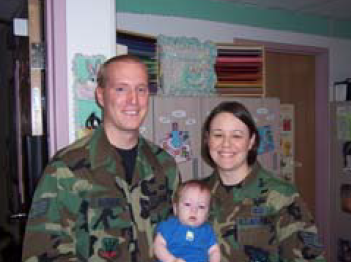
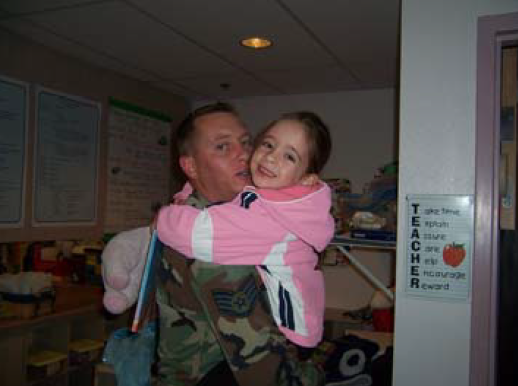
Ten Ways to help your child during deployment
- Take good care of yourself and be a secure base for your child.
- Remain calm and attend quickly to your child’s needs.
- Express your strongest emotions away from your child.
- Talk about your feelings and help the child express their feelings. For example, “I feel scared.”
- Keep a regular routine and turn off the TV and radio during news broadcasts and war-related shows.
- Be patient and calm.
- Remember your child’s behavior is how the child expresses his/her feelings
- Respond with love and reassurance
- Give extra hugs and hold the child in your lap
- Plan fun activities with your child.
- Read books, draw pictures, play pretend games, sing songs
- Use the “Bridging the Miles” ideas in this booklet to stay connected.
- Seek support and utilize resources such as the Family Resource Center, which offers counseling, support groups and family activities.
- Strengthen extended family and community bonds by forming playgroups with other deployed families and participating in special activities together.
Before Deployment
Start a Family Scrapbook
Create a scrapbook of pictures of daily routines, letters, maps, souvenirs, special events and activities. A scrapbook can help a child remember the parent while they are away and help the child recognize and reconnect with the parent when they return. Enjoy and keep adding memories for years to come.
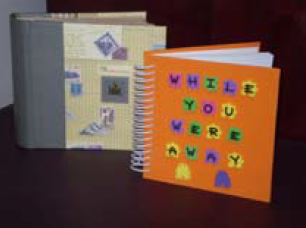
Story Time
Record tapes of yourself reading your child's favorite storybooks. Children can listen to you “read” them a bedtime story each night.
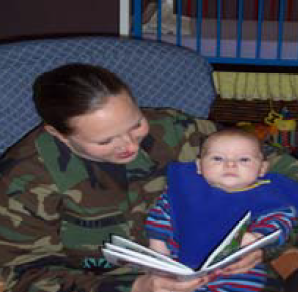
Treasure Hunt
Hide notes and small gifts before you leave. Every few weeks send home clues or a treasure map for the family to find the “treasures.”

Create a “Time Jar”
Fill a large jar with hugs and kisses (candy). Put the deployed parent’s picture on the jar. Put in enough candy for the number of days the deployed parent is expected to be gone. Each day have the child take out a hug and a kiss from mom/dad. As the amount of candy decreases, the return of mom/dad becomes closer. (If leave is extended add more candy.) You can also use non-food items such as stickers.

Paired Stuffed Animal
Select two similar stuffed animals (you might consider getting two animals that are connected by Velcro or magnets). The child will keep one and the parent will take one with them. When the parent returns, the animals can get “reconnected.”
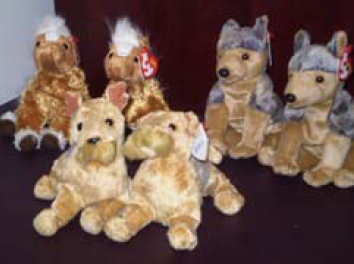
“Talking” Picture Frame, Postcard, Pens or Photo Album
Purchase two “talking” picture frames, postcards or photo albums. Place your picture in one and record a short message. Place your child’s picture in the second one and have them record a short message such as “I love you and I miss you.” You can also use a “talking pen.”

Pillowcases or Handkerchief
Purchase two pillowcases and using an iron-on transfer place a picture of the parent on one and a picture of the child and/or family on the other one. Each night have sweet dreams thinking of each other.

Create a “Safe Place”
Select a special place for the child to be able to go when they need to be alone or need to express their feelings freely.
Packing
Let your child help you pack and prepare for your time away. This is a good time to talk and express love and reassurance.
A Day in the Life Video
Videotape the deployed mom/dad doing everyday routines with the child such as bath time, eating time or reading stories. The child can watch the video while the parent is gone and remember the activities you enjoy doing together.
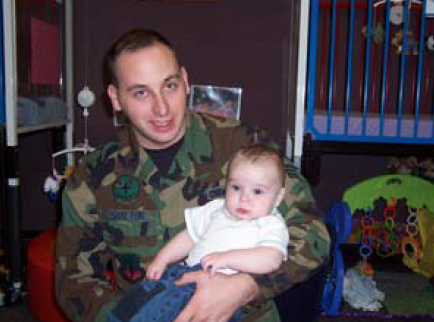
During Deployment
Letters at Dinner
Have a routine of reading letters aloud or talking about the deployed parent at dinner each night.
Photos/Videos/E-mail
Take photos and videos and send them back and forth. You can also send notes, drawings and letters.
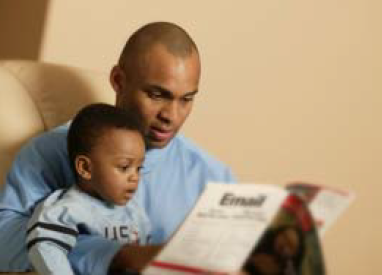
Good Night
Think of a special good night routine. You might want to read the book Goodnight Moon. As you look at the moon each night you could say a special phrase such as “Goodnight moon. Good night mom/dad. I love you. I know I will see you soon.”

A Special Box
Decorate a special box and have your child save treasures for the loved one while they are away. You might want to read the book A Special Box for Daddy by Terry Mapson.
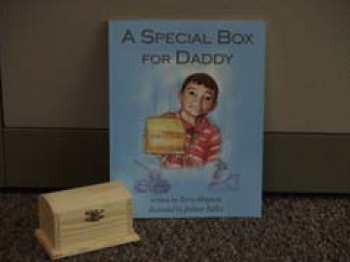
Keep a Family Journal
Record the thoughts and feelings of each child in a special journal.
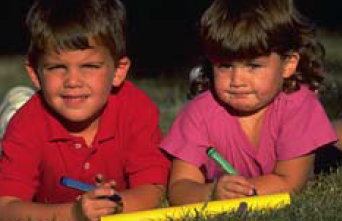
Read Books
Read books that can help children understand deployment and/or feelings of loss and separation. *See Resource List of Books*
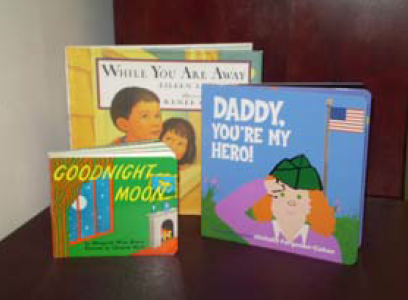
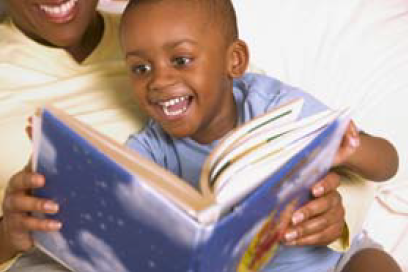
Surprise Notes
Write and send a bunch of notes to your child. Ask your spouse to hide them in the child’s lunchbox or under their pillow.
Blanket with Pictures of Parent
With a digital camera, take pictures of the deployed parent and the child doing everyday activities. Copy the pictures onto iron-on fabric. Then iron the pictures onto a soft comfy blanket. The child will feel the presence of the parent every time they wrap up in the blanket.
“I Love You” Rituals
Dr. Becky Bailey has developed activities and songs that create “I love you” rituals. One of her ideas is to take a pretty lotion bottle, put faces that express different emotions (such as happy, sad, anxious) on the bottle with Velcro. Allow your child to choose a face that shows how she/he is feeling that day then put the lotion on your hand and massage the child’s hand while discussing her/his feelings. For more information go to Conscious discipline.
“While You Are Away” Activity bag
Have a special bag of activities such as art and craft projects, games or puzzles for the child to do while you are away.
Returning Home From Deployment
Family Fun
Keep routines going, add some new ones and return to some prior family favorites. What do you like to do as a family? Go for a walk together, picnic in the park, eat popcorn and/or watch movies. If the child enjoyed lunchbox notes, treasure hunts and taped stories keep doing them.

Enjoy the Family Scrapbook
Share your memories and enjoy looking through your family scrapbook together.

Give the Child Time to Reconnect
Very young children may not remember you at first. Give them time, patience and understanding and let them take the lead in letting you back into their lives. Do not take a child’s reaction to you personally. It is natural (especially for very young children) to need time to remember you and feel comfortable being with you again.
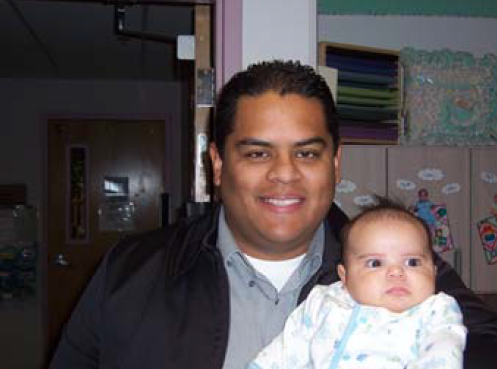
Resources
Books for Children Related to Understanding Deployment, Loss and/or Separation
Daddy, You’re My Hero by Michelle Ferguson-Cohen
This story offers a child’s perspective on the deployment of a parent.
Mommy, You’re My Hero by Michelle Ferguson-Cohen
This story offers a child’s perspective on the deployment of a parent.
While You Are Away by Eileen Spinelli
This story tells about three children whose parents are a sailor, an airwoman and a soldier and the parents are away from home.
A Yellow Ribbon for Daddy by Anissa Mersiowsky
A Yellow Ribbon for Daddy offers a way to help your child understand why a parent is away at war.
Daddy’s in Iraq but I Want Him Back by Carmen R. Hoyt
A true story of three year old Jack and his daddy’s deployment to war in Iraq. Written for small children to view a beginning, middle and end to deployment.
Night Catch by Brenda Ehrmantraut
A timeless story that connects families while they are apart and offers comforting hope for their reunion.
I Miss You; a Military Kid’s Book about Deployment by Beth Andrews
Military families face stressful times that are unique to the military lifestyle. This book discusses some of those issues with helpful insight.
Deployment Journal for Kids by R. Robertson
This colorful, ring-bound book is an excellent vehicle to help kids express their thoughts and feelings at their own pace and in a safe, supportive context.
The Soldier’s Tree by S. Pickup
In a world where bigger is often better, a tiny tree realizes that its extra small size can make an extra big difference. This book is designed to help military children enjoy the Christmas holiday while separated from a loved one overseas.
The Soldier’s Night Before Christmas by Christine Ford and Trish Holland
This version of the Clement Moore’s poem takes place on a U.S. Army base in the desert. The narrator wakes up when he hears a crash, and sees a Blackhawk helicopter giving the all clear to nine Humvees and a Jeep, all loaded with gifts for children.
I Love You Rituals by Becky Bailey
This book offers more than seventy delightful rhymes and games that send the message of unconditional love and enhance children’s social-emotional development.
A Special Box for Daddy by Terry Mapson
A Special Box for Daddy is a heartwarming story about a little boy, a military father and one teacher who made the difference.
Good Night Moon by Margaret Wise Brown and Clement Hurd
Goodnight Moon is a short poem of goodnight wishes from a young rabbit preparing for his own slumber.
The Runaway Bunny by Margaret Wise Brown and Clement Hurd
The Runaway Bunny begins with a young bunny who decides to run away. The soothing rhythm of the bunny banter, along with the surreal, dream-like pictures, gives young readers a sense of security and peace.
Stellaluna by Janell Cannon
Stellaluna, a fruit bat, is separated from her mother and taken in by a bird and her nestlings. She tries to accommodate--she eats insects, hangs head up and sleeps at night, as Mama Bird says she must--but once Stellaluna learns to fly, it's a huge relief when she is reunited with her own mother.
Where the Wild Things Are by Maurice Sendak
Max is sent to bed without supper and imagines sailing away to the land of Wild Things where he is made king. He soon learns being home is better than being king.
Websites
Zero to Three
This website offers wonderful resources to assist during the difficult times of deployment including the booklet “Little Listeners in an Uncertain World: Coping strategies for you and your child during deployment or when a crisis occurs.”
A & E Family Publishers
This website provides links to several helpful resources and links. Books are also available for purchase to help children stay connected to distant parent(s).
Deployment Kids
This child-centered website provides links to journaling topics, coloring pages, games, maps on deployed areas and communication ideas for home and school.
Military Kidz
This website offers games children can download. Players are issued an ID card and allowed access to different military installations and must complete various missions.
Military
This information-based website contains facts about the five different branches of the military, recent publications, current events and links to various military sites.
Other
Nellis Airman Family Resource Readiness Center
702-652-3327 or DSN: 682-3327
99mss.dpf@nellis.af.mil
Your Airman Family Resource Readiness Center can provide you with information and support.
Byington, T., Brownell, T., Hayes, M, Bachman, B.
2007,
Bridging the Miles,
Extension | University of Nevada, Reno, SP-07-10


